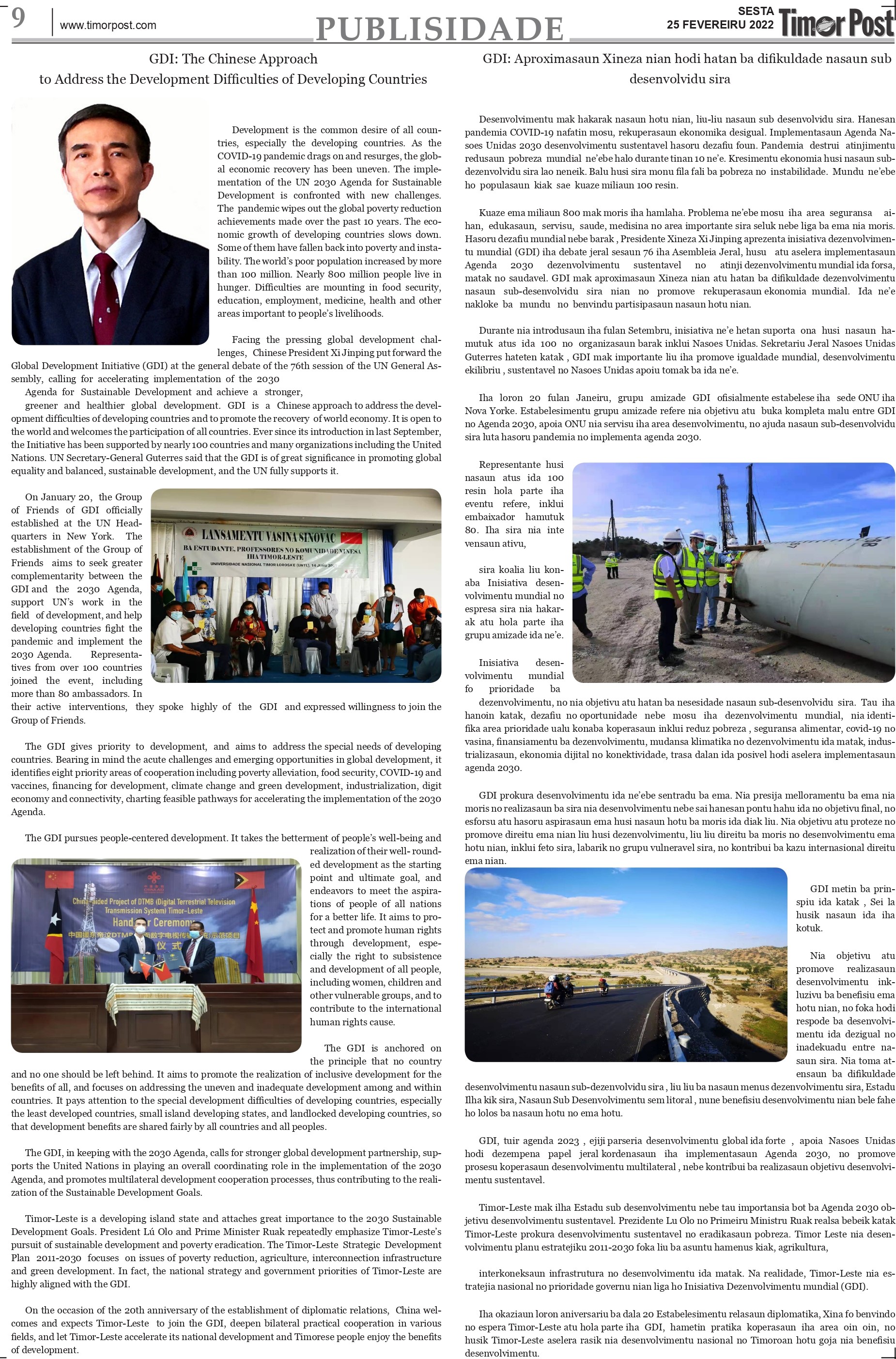On February 25 Timor Post carried an article, both in English and Tetun, by Ambassador Dr. Xiao Jianguo entitled "GDI: The Chinese Approach to Address the Development Difficulties of Developing Countries". The full text is as follows:

Development is the common desire of all countries, especially the developing countries. As the COVID-19 pandemic drags on and resurges, the global economic recovery has been uneven. The implementation of the UN 2030 Agenda for Sustainable Development is confronted with new challenges. The pandemic wipes out the global poverty reduction achievements made over the past 10 years. The economic growth of developing countries slows down. Some of them have fallen back into poverty and instability. The world’s poor population increased by more than 100 million. Nearly 800 million people live in hunger. Difficulties are mounting in food security, education, employment, medicine, health and other areas important to people’s livelihoods.
Facing the pressing global development challenges, Chinese President Xi Jinping put forward the Global Development Initiative (GDI) at the general debate of the 76th session of the UN General Assembly, calling for accelerating implementation of the 2030 Agenda for Sustainable Development and achieve a stronger, greener and healthier global development. GDI is a Chinese approach to address the development difficulties of developing countries and to promote the recovery of world economy. It is open to the world and welcomes the participation of all countries. Ever since its introduction in last September, the Initiative has been supported by nearly 100 countries and many organizations including the United Nations. UN Secretary-General Guterres said that the GDI is of great significance in promoting global equality and balanced, sustainable development, and the UN fully supports it.
On January 20, the Group of Friends of GDI officially established at the UN Headquarters in New York. The establishment of the Group of Friends aims to seek greater complementarity between the GDI and the 2030 Agenda, support UN’s work in the field of development, and help developing countries fight the pandemic and implement the 2030 Agenda. Representatives from over 100 countries joined the event, including more than 80 ambassadors. In their active interventions, they spoke highly of the GDI and expressed willingness to join the Group of Friends.
The GDI gives priority to development, and aims to address the special needs of developing countries. Bearing in mind the acute challenges and emerging opportunities in global development, it identifies eight priority areas of cooperation including poverty alleviation, food security, COVID-19 and vaccines, financing for development, climate change and green development, industrialization, digit economy and connectivity, charting feasible pathways for accelerating the implementation of the 2030 Agenda.
The GDI pursues people-centered development. It takes the betterment of people's well-being and realization of their well-rounded development as the starting point and ultimate goal, and endeavors to meet the aspirations of people of all nations for a better life. It aims to protect and promote human rights through development, especially the right to subsistence and development of all people, including women, children and other vulnerable groups, and to contribute to the international human rights cause.
The GDI is anchored on the principle that no country and no one should be left behind. It aims to promote the realization of inclusive development for the benefits of all, and focuses on addressing the uneven and inadequate development among and within countries. It pays attention to the special development difficulties of developing countries, especially the least developed countries, small island developing states, and landlocked developing countries, so that development benefits are shared fairly by all countries and all peoples.
The GDI, in keeping with the 2030 Agenda, calls for stronger global development partnership, supports the United Nations in playing an overall coordinating role in the implementation of the 2030 Agenda, and promotes multilateral development cooperation processes, thus contributing to the realization of the Sustainable Development Goals.
Timor-Leste is a developing island state and attaches great importance to the 2030 Sustainable Development Goals. President Lú Olo and Prime Minister Ruak repeatedly emphasize Timor-Leste's pursuit of sustainable development and poverty eradication. The Timor-Leste Strategic Development Plan 2011-2030 focuses on issues of poverty reduction, agriculture, interconnection infrastructure and green development. In fact, the national strategy and government priorities of Timor-Leste are highly aligned with the GDI.
On the occasion of the 20th anniversary of the establishment of diplomatic relations, China welcomes and expects Timor-Leste to join the GDI, deepen bilateral practical cooperation in various fields, and let Timor-Leste accelerate its national development and Timorese people enjoy the benefits of development.
